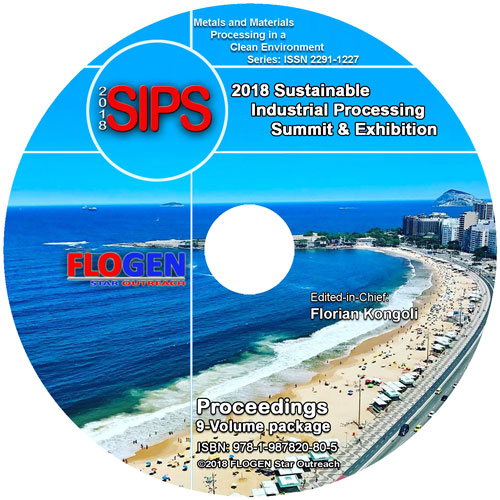2018-Sustainable Industrial Processing Summit
SIPS2018 Volume 7. Non-ferrous / Mineral Processing / Environmental Protection
| Editors: | F. Kongoli, Z. Wang, T. Okura, E. Souza, A. C. Silva |
| Publisher: | Flogen Star OUTREACH |
| Publication Year: | 2018 |
| Pages: | 256 pages |
| ISBN: | 978-1-987820-94-2 |
| ISSN: | 2291-1227 (Metals and Materials Processing in a Clean Environment Series) |

CD shopping page
Creating a Sustainable Future: Industrial Processing and Productive Chains
Pedro Prates Valério1; Elém PatrÃcia Alves Rocha2; Jesus Maria Frias Celayeta3; Marcelo Cardoso2; Erika Cristina Cren2;1UNIVERSITY CENTER OF BELO HORIZONTE (UNIBH), Belo Horizonte, Brazil; 2FEDERAL UNIVERSITY OF MINAS GERAIS, Belo Horizonte, Brazil; 3DUBLIN INSTITUTE OF TECHNOLOGY, Dublin, Ireland;
Type of Paper: Plenary
Id Paper: 395
Topic: 10
Abstract:
The chemical and food industries have been responsible for most of the growing global demand for raw materials around the world. In this framework, it should be highlighted that industrial sustainability may involve assessing trade-offs among multiple dynamic goals and striving for continual improvement, rather than achieving a specific state. In this sense, there is a clear need for knowledge on new sources of feedstock as a way of strengthening the global economy and meeting impending industrial demands worldwide [1,2]. Certainly, this scenario brings challenges that need to be overcome regarding processing industries and sustainable research. In this context, ongoing studies carried out by our Research Group at Federal University of Minas Gerais (DEQ/UFMG) in collaboration with international research have provided valuable data and procedures that not only covers thermal conversion processes and chemical kinetics but also physical-chemical properties of lignocellulosic-based materials (forestry waste, agricultural residues and agro-industrial waste) [3,4] contributing to the outcome of significant applications in the fields of Science and Technology as well as of Sustainable Industrial Processing. Results obtained are an environmentally friendly alternative relating to edible oils extraction and energy conversion technologies in connection to biorefining. The study has identified some of the main agricultural and forest residues demonstrating the importance of adding value to waste steam (activated coal; vegetable coal; animal feed; nutraceutical food; cosmetics) by the generation of co-products from the processing of alternative raw materials.